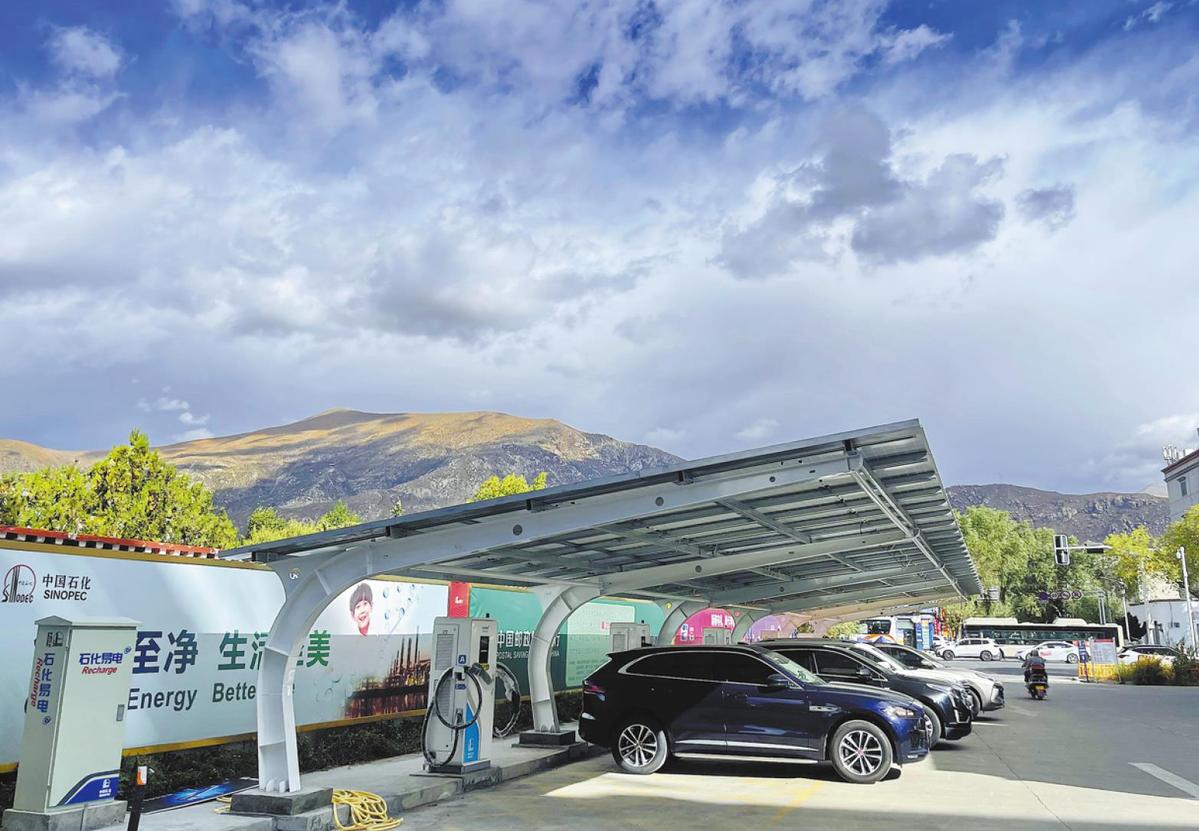By PALDEN NYIMA and DAQIONG in Lhasa Source:China Daily 2024-08-09

The number of new energy vehicles in the Xizang autonomous region exceeded 10,000 units for the first time as of the end of June, representing a significant step forward in its efforts to promote NEVs, according to data from Xizang's comprehensive public security traffic management application platform.
The 2023 Environmental Bulletin for the Xizang autonomous region, released by the region's ecology and environment department in June, said NEVs now account for 85.3 percent of Xizang's buses as a result of efforts to promote the use of green transportation. Meanwhile, the proportion of nonfossil energy in total energy consumption now exceeds 50 percent, ranking tops nationwide.
During the January-June period, a total of 63,222 new vehicles were registered in the region, showing a 4.6 percent year-on-year increase — a growth rate 6.5 percentage points higher than that of the first quarter. Among these registrations, 4,682 NEVs were newly registered, representing an impressive 263 percent year-on-year growth, Xizang Daily reported.
Yang Zhanhui, an official from the region's department of commerce, said that the market share of NEVs in Xizang has risen from 2.3 percent in 2021 to 24.4 percent now.
"Currently, the top three bestselling vehicle models in the region are all new energy vehicles, indicating that NEVs have become a vital driver for the growth of automobile consumption in Xizang," said Yang.
Not only popular domestically, but such NEVs are also gaining traction abroad. In 2023, 4,867 NEVs were exported from Xizang land ports to Nepal. The first quarter of 2024 saw a significant increase, with 1,623 NEVs exported to Nepal from Xizang, marking a sixfold rise compared to the same period a year earlier. Sedans and small passenger cars constituted over 90 percent of the types of NEVs exported from Xizang ports.
With advances in technology, NEVs have seen substantial improvements in performance and range, leading to an increase in consumer acceptance. Policies aimed at promoting NEV consumption, such as enhanced subsidies and accelerated charging infrastructure development, have paved the way for the market promotion of NEVs, propelling the sector in the region onto a path of rapid development.
The regional commerce bureau highlighted a noticeable upward trend in the sales volume of NEVs in Xizang. National policies offering exemptions and reductions in vehicle purchase taxes for NEVs provide further incentives for consumers. Additionally, major auto dealers in Xizang are offering substantial discounts to consumers, further boosting purchasing appetites.
The national policy on continuing and optimizing the exemption of vehicle purchase taxes for NEVs specifies that NEVs bought between Jan 1, 2024 and Dec 31,2025, are exempt from vehicle purchase taxes.
Each new energy passenger car is exempt from taxes up to 30,000 yuan ($4,100), and for NEVs purchased between Jan 1, 2026 and Dec 31, 2027, the vehicle purchase tax will be halved. Each new energy passenger car is entitled to a tax reduction of up to 15,000 yuan.
Along with the increase in NEV consumption in the region, NEV sellers have been working on improving after-sales services, including promoting the coverage of installation of charging stations.
US automaker Tesla said it has established multiple charging stations and an authorized after-sales service center in the region, providing convenient services for vehicle owners.
Huang Lei, a regional general manager at Tesla, said that as of August, Tesla had set up eight supercharging stations and 15 destination charging stations in Xizang, covering 10 cities and providing support and assurance for electric vehicle owners traveling in the region.
Xizang deems ecological construction and environmental protection as important components of its modernization efforts, so the development of NEVs can better safeguard the fragile plateau ecology, said Huang.
Xu Xin, an owner of an NEV in the regional capital of Lhasa, said that she often commutes long distances in Xizang with her Model Y for work purposes.
"Compared to fuel vehicles, NEVs do not experience 'altitude sickness' when driving to places at high altitudes, and they offer stronger and more stable power," said Xu.
"The charging costs are relatively low, I mainly use public charging stations, with a full charge costing about 50 yuan, much lower than a fuel vehicle covering the same distance.
"More importantly, NEVs are zero-emission, which helps protect the fragile ecological environment."
Copyright © Xizang Daily & China Xizang News All rights reserved
Reproduction in whole or in part without permissions prohibited
Index Code: 藏 ICP 备 05000021 号
Producer: Xizang Daily International Communication Center